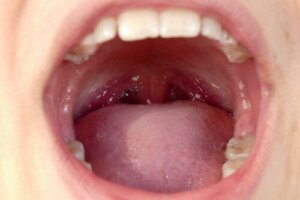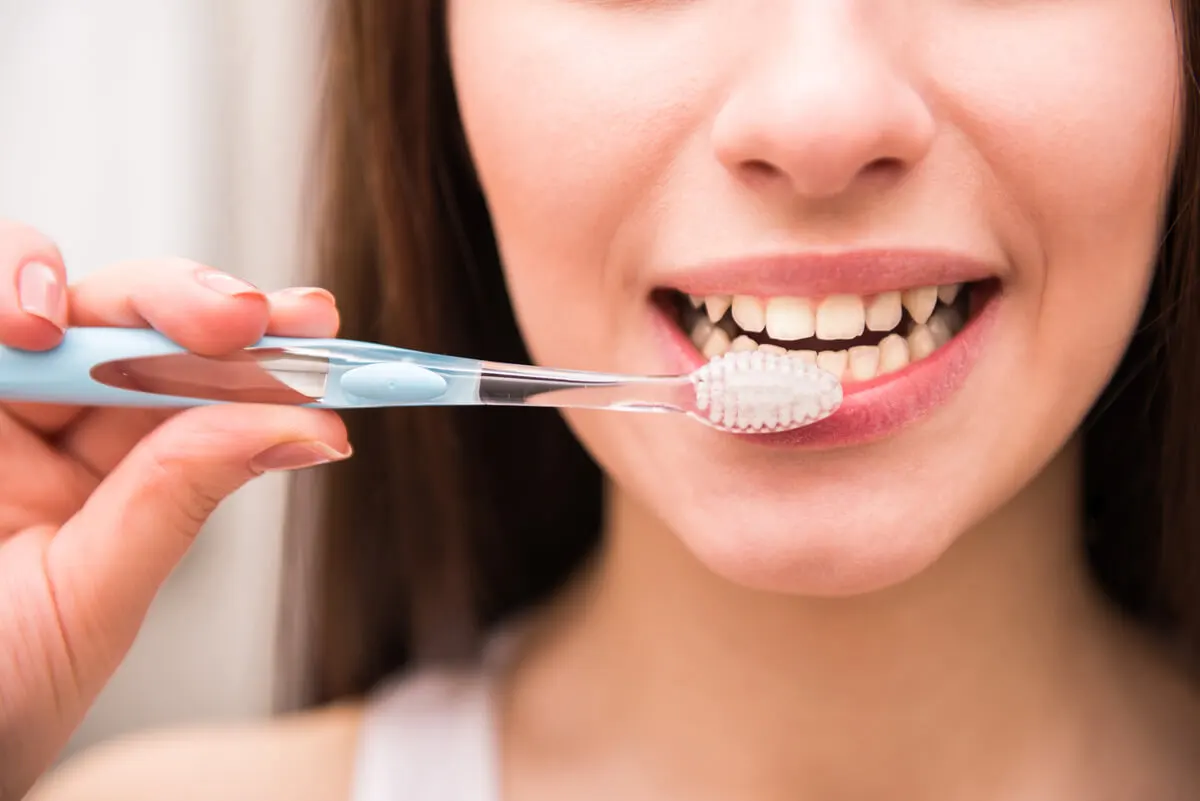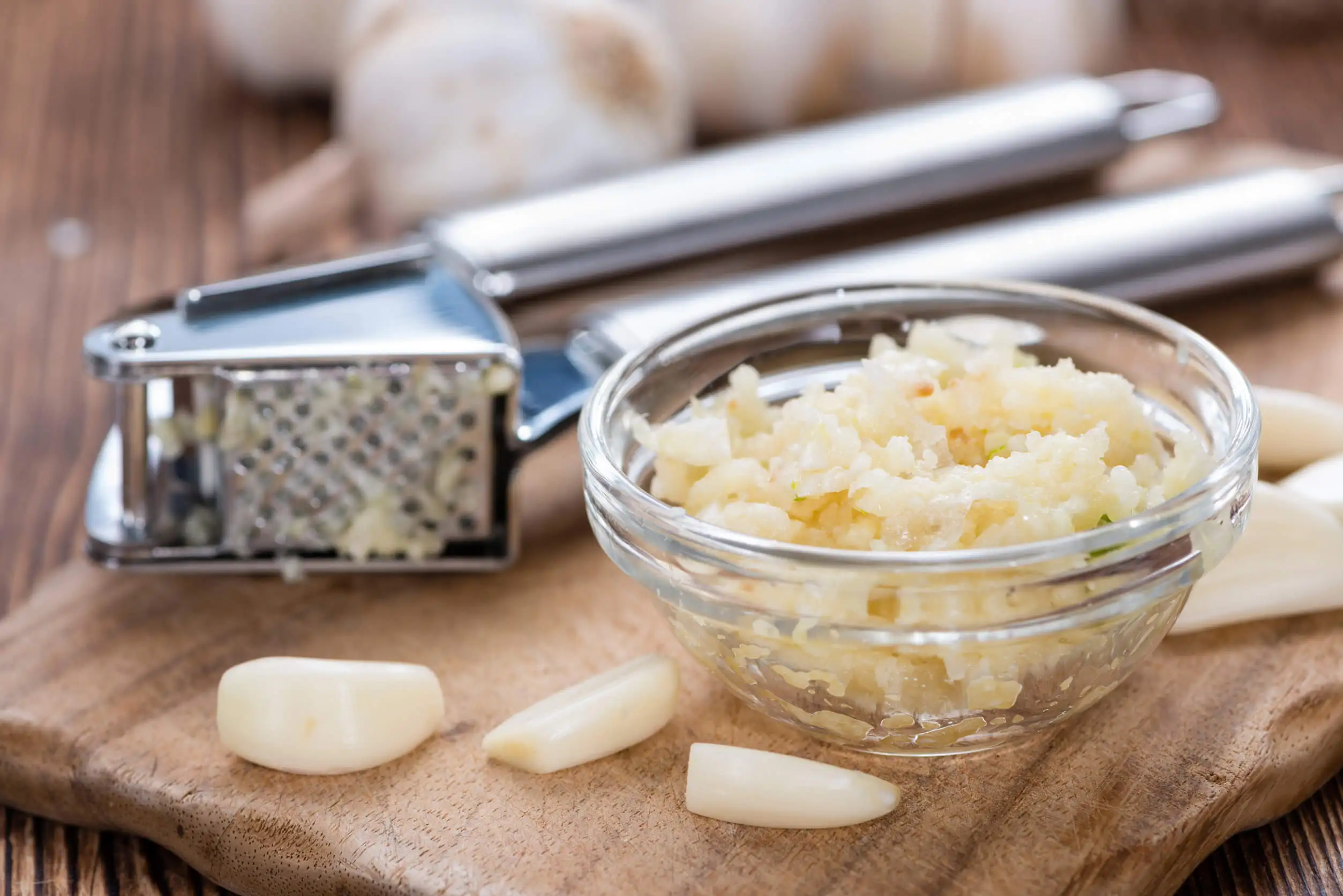How to Prevent and Eliminate Tonsil Stones at Home

To prevent and eliminate tonsil stones, it’s necessary to reinforce oral hygiene habits. Beyond this, there are some care and natural remedies that can help. The important thing is to intervene in a timely manner, since their accumulation can lead to discomfort such as bad breath or swallowing difficulties.
But what is this condition? Well, tonsil stones are small masses of tissue that are usually located at the back of the throat, right in the palatine tonsils. They’re usually formed by the accumulation of food debris and bacterial growth.
Although they go unnoticed at first, over time they cause swelling, pain, a feeling of blockage in the throat, and halitosis problems. However, some strategies help prevent their formation and promote their treatment.
What you should know about tonsil stones
Tonsil stones are also known as “tonsilloliths”. They’re formations that appear due to the calcification of various substances in the folds of the palatine tonsils. To be more precise, they’re composed of food particles, bacteria, mucus, and dead white blood cells that are retained in this area.
They are different sizes, almost always small, but can reach the size of a pea. They’re often visible to the naked eye as a white or yellowish mass. However, sometimes they’re located in the deep tonsillar tissue, which makes them difficult to detect.
However, there are some clinical manifestations that help you to suspect this problem. Among them, the following stand out:
- Bad breath
- Ear pain
- Sore throat
- Inflamed tonsils
- Difficulty swallowing food
- The sensation of an obstruction in the throat
In most cases, tonsilloliths are expelled on their own with time. Moreover, they disappear with the implementation of good hygiene habits and some home remedies. However, if they become persistent or painful, the doctor may suggest a tonsillectomy as a solution.
This is a surgical removal of the tonsils, which is reserved only for those cases in which the stones don’t disappear with other solutions. The process is ambulatory, but may result in postoperative bleeding. Therefore, it involves some care.
Read more here: Treatment for Acute Tonsillitis
Measures to prevent tonsil stones
Before knowing how to eliminate tonsil stones at home, it’s good to highlight healthy habits that can help to prevent them. About these, it’s worth clarifying that they should all be implemented together, as one thing alone won’t have long-term effects.
Strengthen oral hygiene
Undoubtedly, proper oral hygiene habits play an important role in the prevention of tonsil stones. Both brushing and flossing help remove bacteria and food debris that can contribute to this problem.
Ann Bell, an expert in otolaryngology, suggests brushing our teeth after every meal. She also points out the importance of brushing the tongue, using dental floss and supplementing with alcohol-free mouthwashes.

Use a tongue scraper
Although brushing the tongue is a valid option to remove tartar that accumulates on its surface, scrapers stand out for their effectiveness in this task. In a study shared in the Journal of Periodontology, this instrument exhibited better results in removing volatile sulfur compounds on the tongue.
Watch your diet
Eating habits can either improve or worsen things in the case of tonsil stones. While some foods help keep the oral cavity and tonsils healthy, others tend to increase the risk of infections, bad breath, and deposits.
Such is the case with foods abundant in sugar, which feed oral bacteria and lead to the production of acidic substances that affect the oral microbiota. Its abundant consumption increases the risk of calculus, bacterial plaque, and caries.
Visiting the dentist regularly
Visiting the dentist regularly is a preventive measure that shouldn’t be overlooked. Ideally, visits should be repeated every 6 months, or sooner if required by the professional. At the dentist’s office, the expert will perform a deeper cleaning of the mouth and evaluate if there are complications associated with tonsilloliths.
How to eliminate tonsil stones at home?
In general, tonsil stones don’t require specific treatment beyond hygiene habits. They almost always disappear on their own after a certain period of time.
However, if you notice their presence, some home remedies can help to eliminate them. The options are as follows.
Apple cider vinegar rinse
In folk medicine, apple cider vinegar is considered an adjuvant to reduce the presence of bacteria in the mouth. In this regard, some research suggests that it has antimicrobial effects that favor the elimination of oral bacteria such as S. aureus bacteria in the mouth. Even so, more research is needed.
In any case, it should be noted that it can’t be used in its pure state. The ideal thing is to dilute one tablespoon (10 milliliters) in a glass of warm water (200 milliliters). This is because its acids are associated with permanent damage to tooth enamel.
Low pressure irrigator
When tonsilloliths are superficial, the use of a low pressure irrigator may be sufficient to dislodge them. To do this, simply point the device at the deposits in the throat. Once the tonsillolith is loosened, spit it out and prevent it from going to the back of the throat.
Garlic supplements
Natural garlic and its derivative supplements can help in the removal of tonsil stones. Due to its antimicrobial properties, its consumption is associated with inhibiting the bacteria that cause this condition. However, it should be considered that its aroma is strong and it can cause bad breath.

Gargling with salt water
An article shared by the Cleveland Clinic highlights that gargling with salt helps reduce swelling and discomfort in the presence of tonsil stones. To do this, simply mix a teaspoon of salt in a cup of water. Then, you can swish it for a couple of minutes and expel the liquid.
Cotton swab
Some people try to remove the tonsil stone with the help of a cotton swab. This option is usually valid when the stones are visible. However, be very careful, as it’s a method that can cause injury if applied aggressively.
It’s advisable to moisten the swab a little before inserting it. If, after a few attempts, the calculus isn’t dislodged, then it’s better to stop.
In this area there are many blood vessels that can be compromised.
Essential oils
Some essential oils, such as tea tree oil, clove oil or thyme oil, have antimicrobial properties that help keep the mouth clean. Their application as a rinse is useful to fight bacteria associated with tonsilloliths. However, caution should be exercised when using them.
On their own, they’re irritating and can cause discomfort. Therefore, it’s advisable to dilute about 8 to 10 drops per glass of water. Once gargled, the residue should be expelled.
Are there any other ways to eliminate tonsil stones?
In addition to the above-mentioned remedies, there are other methods used to eliminate tonsil stones. For example, it’s possible to buy a special kit to remove tonsilloliths by suction in pharmacies. Of course, you need to know how to use it well in order to avoid injuries.
When the formation of calculi is due to an abnormal growth of bacteria in the mouth, the doctor may suggest a treatment with antibiotics. In addition, if swelling is present, anti-inflammatory medications may be recommended. Whatever the case, the use of medication should be by prescription only.
Discover more here: How to Naturally Soothe Swollen Tonsils
What to remember?
The presence of tonsil stones is uncomfortable and alerts us to the presence of bacteria and food debris. This often disappears with the implementation of good oral hygiene habits. However, because of the shape of the tonsils, some people may experience them recurrently.
When remedies and self-care measures don’t work, the physician may evaluate the possibility of removing the tonsils. Whatever the case, professional assessment is key in order to ensure appropriate intervention.
All cited sources were thoroughly reviewed by our team to ensure their quality, reliability, currency, and validity. The bibliography of this article was considered reliable and of academic or scientific accuracy.
- Yellamma Bai K, Vinod Kumar B. Tonsillolith: A polymicrobial biofilm. Med J Armed Forces India. 2015;71(Suppl 1):S95-S98. doi:10.1016/j.mjafi.2011.12.009
- Bell, A. (2014). Medidas de autocuidado pueden ayudar a prevenir los cálculos amigdalinos. Mayo Clinic. Disponible en https://newsnetwork.mayoclinic.org/discussion/medidas-de-autocuidado-pueden-ayudar-a-prevenir-los-calculos-amigdalinos/#:~:text=La%20buena%20higiene%20oral%20puede,use%20hilo%20dental%20a%20diario.
- Pedrazzi V, Sato S, de Mattos Mda G, Lara EH, Panzeri H. Tongue-cleaning methods: a comparative clinical trial employing a toothbrush and a tongue scraper. J Periodontol. 2004 Jul;75(7):1009-12. doi: 10.1902/jop.2004.75.7.1009. PMID: 15341360.
- Esberg A, Haworth S, Hasslöf P, Lif Holgerson P, Johansson I. Oral Microbiota Profile Associates with Sugar Intake and Taste Preference Genes. Nutrients. 2020;12(3):681. Published 2020 Mar 3. doi:10.3390/nu12030681
- Yagnik, Darshna et al. “Antimicrobial activity of apple cider vinegar against Escherichia coli, Staphylococcus aureus and Candida albicans; downregulating cytokine and microbial protein expression.” Scientific reports vol. 8,1 1732. 29 Jan. 2018, doi:10.1038/s41598-017-18618-x
- Willershausen I, Weyer V, Schulte D, Lampe F, Buhre S, Willershausen B. In vitro study on dental erosion caused by different vinegar varieties using an electron microprobe. Clin Lab. 2014;60(5):783-90. doi: 10.7754/clin.lab.2013.130528. PMID: 24839821.
- Ankri S, Mirelman D. Antimicrobial properties of allicin from garlic. Microbes Infect. 1999 Feb;1(2):125-9. doi: 10.1016/s1286-4579(99)80003-3. PMID: 10594976.
- Tonsil Stones. (2021). Cleveland Clinic. Available in https://my.clevelandclinic.org/health/diseases/21505-tonsil-stones
- Salvatori, C et al. “A comparative study of antibacterial and anti-inflammatory effects of mouthrinse containing tea tree oil.” ORAL & implantology vol. 10,1 59-70. 10 Apr. 2017, doi:10.11138/orl/2017.10.1.059
- Moon SE, Kim HY, Cha JD. Synergistic effect between clove oil and its major compounds and antibiotics against oral bacteria. Arch Oral Biol. 2011 Sep;56(9):907-16. doi: 10.1016/j.archoralbio.2011.02.005. Epub 2011 Mar 12. PMID: 21397894.
- Thosar, Nilima et al. “Antimicrobial efficacy of five essential oils against oral pathogens: An in vitro study.” European journal of dentistry vol. 7,Suppl 1 (2013): S071-S077. doi:10.4103/1305-7456.119078
This text is provided for informational purposes only and does not replace consultation with a professional. If in doubt, consult your specialist.








